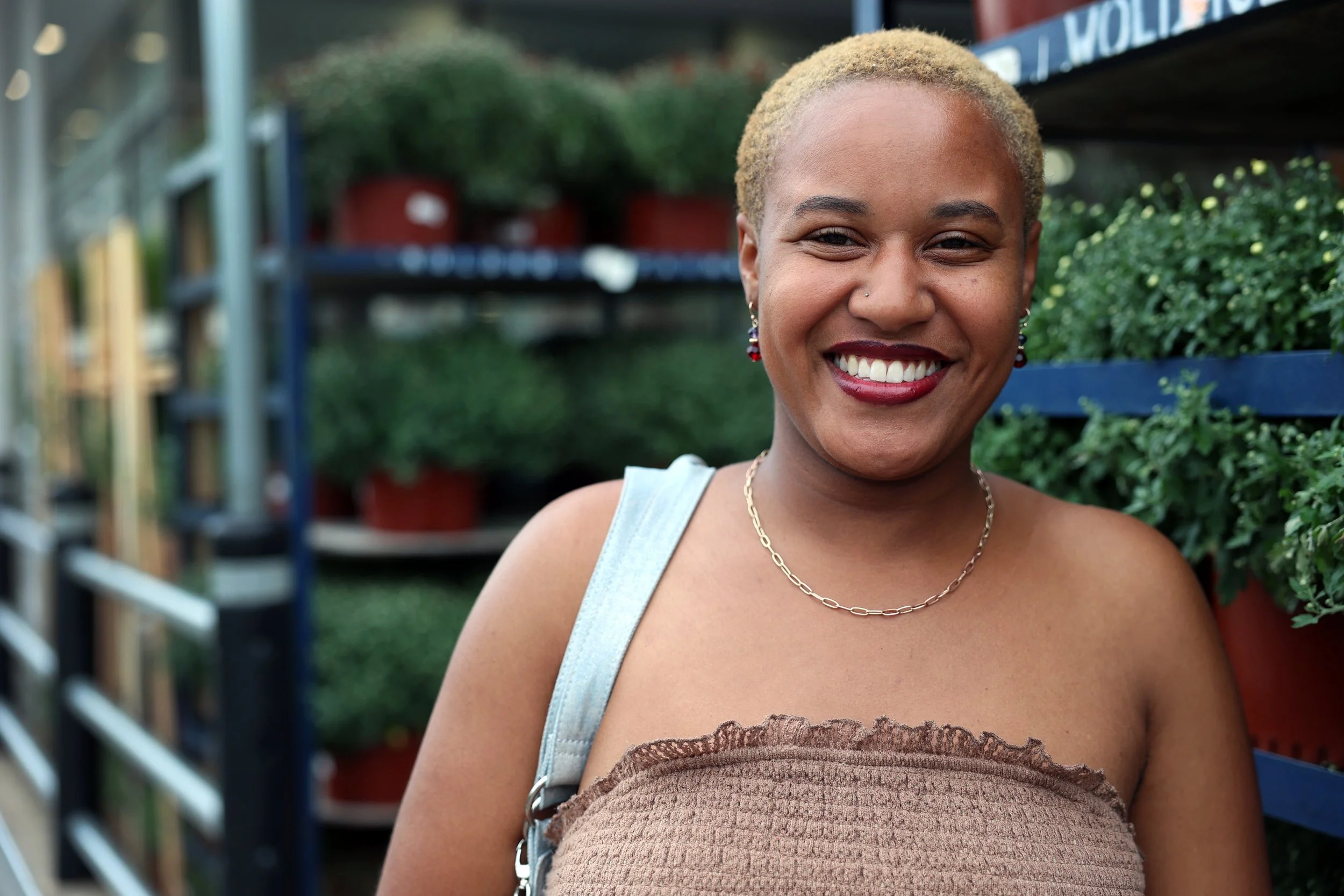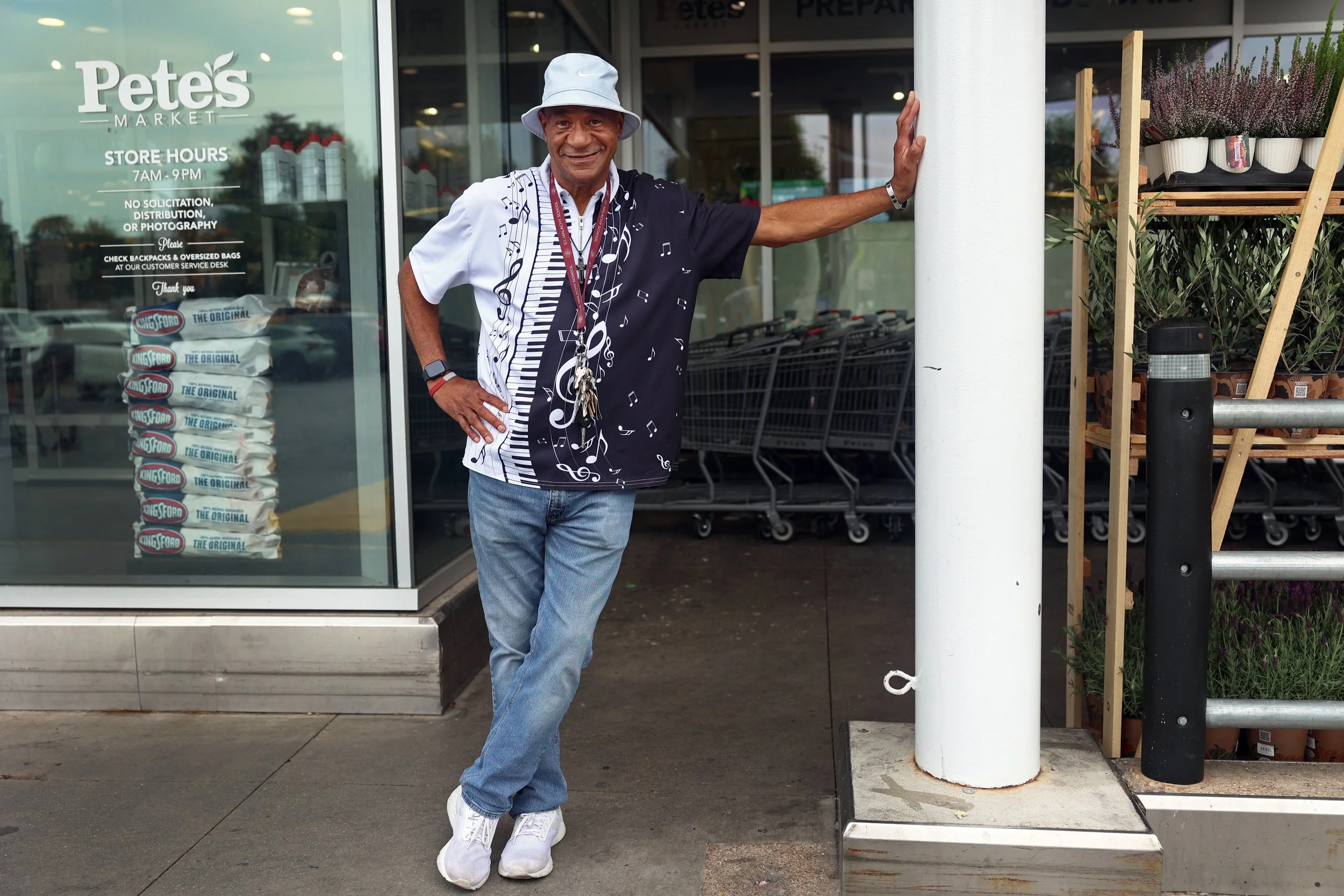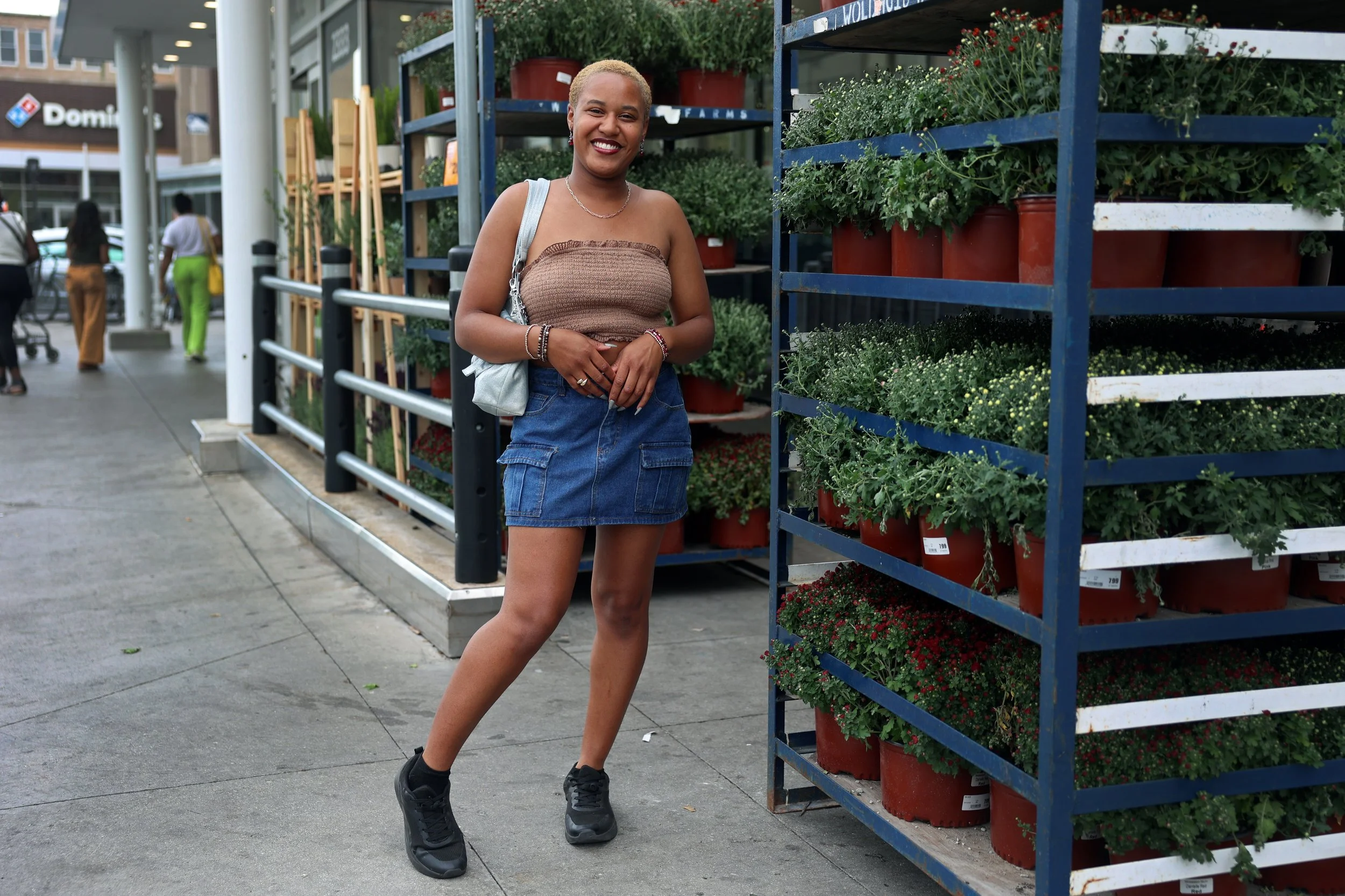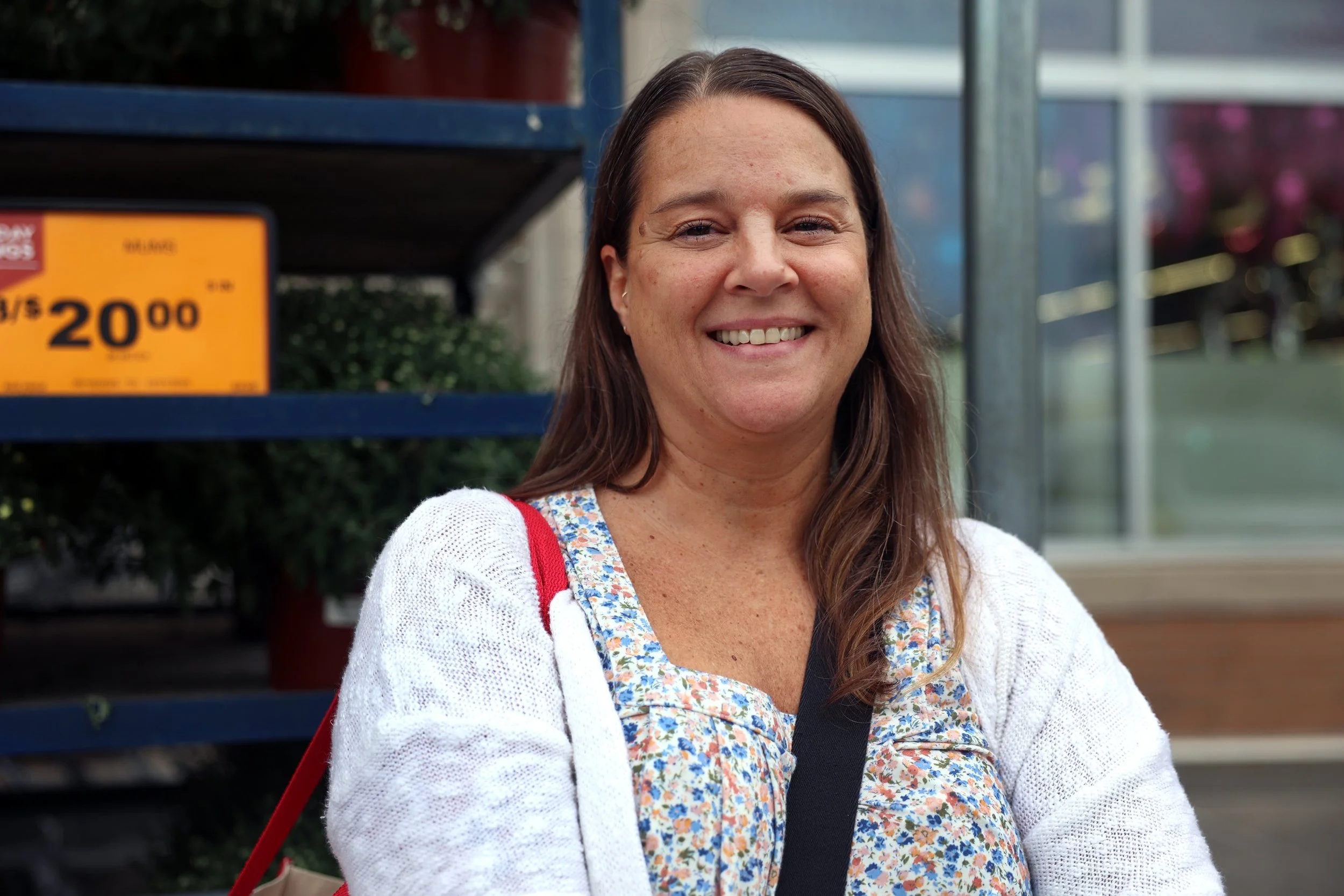Near West Side grocery shoppers describe how intergenerational ties are shifting — from church pews to chosen families — and what younger people are carrying forward on the South and West sides.
By Marium Asif and Amari Davis
Lex Vernet, 27, stands outside Pete’s Fresh Market on Sept. 19, 2025, in Near West Side. (Anastasia Busby/for City Bureau)
Who gets to grow up surrounded by elders — or have mentors who invest in them?
City Bureau Civic Reporting fellows spoke to grocery shoppers in Near West Side on a fall afternoon to learn more about the intergenerational relationships in their lives. Those connections once lived on front stoops and in church pews; these days, they also live in clinics, group chats, rehearsal rooms, and queer potlucks. While the forms have shifted, the need hasn’t.
Neighbors described taking care of each other out of necessity, whether that meant church members correcting kids’ behavior on the block, or queer elders becoming chosen family. For others, the lack of those ties left them searching for guidance or building new intergenerational spaces from scratch. Across interviews, people agreed that family — biological or chosen — remains where generational divides are most visible. Many also agreed that younger generations are more outspoken and more online, and their perspectives around community are shifting.
Whether it’s a minister-educator keeping a drumline together, a nurse urging patients to think about their futures, a Gen Z organizer naming burnout, or a young woman determined to break generational struggle, each person is staking out a way to make room for the next generation.
These conversations have been edited and condensed for clarity.
Stanley Ratliff stands outside Pete’s Fresh Market on Sept. 19, 2025, in Near West Side, Chicago. Ratliff is a music teacher at St. Malachy High School in Near West Side. (Anastasia Busby/for City Bureau)
Pete’s Fresh Market, Near West Side
The plaza at Madison Street and Western Avenue hums with late-afternoon life. Families file in and out of Pete’s grocery store, kids stroll alongside their parents through the parking lot while drivers circle for a spot, and car horns sound over the din. The sun is missing on this overcast day as music floats from open car windows as people smoke, wait, or rush in and out of the storefronts.
Stanley Ratliff, 67, is a longtime music teacher and minister at Living Word Christian Center AME Church in west suburban Forest Park . Raised “old school” in the 1970s and ’80s, Ratliff has run a drumline and music school for more than 25 years and founded Hope House, a home for men reentering society after incarceration. At his church, seniors, middle-aged members, and young people all gather, creating a mix of generations under one roof.
What was community like when you were growing up?
The older generation corrected us. The kids on the block, if we played and the parents saw us doing something wrong, they’d correct us. They’d even whoop us sometimes. But now, people don’t even know their neighbors. People don’t talk to each other.
What do you notice about young people today?
I like some of the young folks, but some of the young kids in the mix now, they’re so disrespectful to each other and don’t respect the teachers.
It’s terrible. They come in and they want to talk more than learn. Some kids want to learn, but the kids who don’t want to learn, they take all my attention.
What’s your hope for the next generation?
Wake up. Wake up [to what’s around you]. Try to learn, because [we] see what’s going on in Washington, D.C. People have died for you to have education.
Darryl Wheeler is a businessman from Englewood who helps operate Reggae Boyz, a food truck that serves Jamaican cuisine throughout the city. After spending most of his career in the furniture industry, he works at the food truck to gain experience in hopes of starting his own business one day.
What community values were important when you were growing up?
It took a village to raise a child. When a child did something wrong, you might get two whoopings: one from your mama and one from your neighbor. We had to go to school, we had to respect our elders: ‘Yes, sir’ and, ‘No, sir.’ And you better be home before the streetlights came on!
What do you think changed between when you were growing up and now?
The system is rigged against the low-income communities. There’s no jobs. The system is set up to where the kids get in trouble, can’t get a job because they have a felony, and it leaves them no choice but to go out and do what they do to survive. Not just the government system; it’s worldwide. They are against African Americans and low-income communities. They prosper off the backs of the low-income communities. The police stop you every chance they get, to try to keep you oppressed … and only the strong will survive.
Do you think the younger kids are trying to rebel against that?
I don’t know … We’re living in bad times, because if we were to look 20 years from now, we’d have no Black leaders. These young guys ain’t no leaders. We’re at the point of no return if we don’t get it together right now.
What do you think the kids need right now?
They need some programs, man. They took all of the programs out of the schools — economic programs like trades and mechanic shops. These kids should be able to go out and learn a trade, because not everybody wants to go to college. Everybody isn’t college material; some might want to get a good mechanic job or electrician job. Back in my day, you could go do that. I took a metal trade, I used to make barbecue grills and try welding.
If we don’t come together and show each other love and stick together, we’ll end up at a point of no return. We’ve got to open up more businesses. If we create more businesses, we’ll have more jobs to give these young brothers opportunities, and a lot of them wouldn’t be standing out there in the streets, selling drugs. If you give these guys really productive jobs, not a petty minimum wage job, these guys wouldn’t be out here.
Lex Vernet, 27, stands outside Pete’s Fresh Market on Sept. 19, 2025, in Near West Side, Chicago. (Anastasia Busby/for City Bureau)
Lex Vernet, 27, is a nanny and organizer who lives in Humboldt Park. Identifying as “old Gen Z,” they say their most meaningful intergenerational relationships come through queer and Black community spaces, where chosen family and mentorship blur across age brackets. While they admire Gen Z’s willingness to quit jobs that don’t serve them and chase fulfillment, they also note that younger peers are more chronically online, shaped by a digital childhood that was both liberating and detrimental.
Where do you see intergenerational relationships in your life?
Queer spaces tend to be very intergenerational. Especially events. We’re a lot more accepting of the idea that we should talk to our elders. I think we are looking for family. I had a queer godmother. She had people of all ages as her godchildren. She’s still invoked in our space, in spirit with us today.
Even not just queer spaces — I mean especially in the Black community, we do it all the time. You get close with friends, you get close with people you might meet on the street and you start calling them cousin and brother. You know, blood [alone] doesn’t make you closer.
How do you describe your generation?
I think that Gen Z increasingly gives less of a f—, and I think that has only gotten more apparent as the kids get younger in my generation. I definitely feel the energy of, ‘I'm gonna quit the job if it doesn't serve me; I'm going to take care of myself, regardless of the situation; I'm gonna chase the job that actually feels fulfilling, or be in spaces that are fulfilling, especially as a queer person.’
What does respect mean for your generation?
Respect for us has a lot more to do with how people treat us and how people are considerate of us. A lot of older generations had arbitrary things that they hadn’t always analyzed that go into respect. Like when people say, ‘Nobody greets anybody when you walk into a store.’ For us, that job is tedious. I’m not pressed if someone doesn’t say hi to me.
I also know a lot of older folks who sat through a job for 30 or 40 years where they weren't being respected. They respected hierarchy; we’re trying to be done with hierarchy. Respectability goes out the window, and we’re replacing it with a more complex understanding of respect.
What’s your hope for the next generation?
I hope the next generation really chases their dreams — like genuinely chases their dreams, not from a place of rebellion, not from, ‘I have to live in this world, I have to make money.’ That's all fine and dandy … but can we move toward a place that doesn’t feel like we're being crushed by the weight of the world, and where we’re continuing to fight for things that matter. [Can we move toward a world] where we don't get burnt out, especially with the political climate, because it feels like they're trying to burn us out.
Jakiyah Harris, 20, lives in Garfield Park. She feels her generation is more outspoken, determined to interrupt cycles of silence and struggle. While she doesn’t view herself as a mentor, she hopes to be part of a larger movement for change — whether through entrepreneurship, advocacy or community.
What does being Gen Z mean to you?
We are breaking generational curses, especially in the Black community. The generation before us tried, but they thought a lot of stuff was normal. They didn’t know it wasn’t acceptable. We know it’s not acceptable, so we try to change the stuff they do.
What do older people think of your generation speaking up?
I feel like they still think we’ve got to earn this stuff, but I feel like the older generation feels like they can disrespect the younger generation. They’ll say we’re disrespectful, but we’re just speaking up for ourselves.
How has struggle passed down across generations?
The [boomer] generation before our parents dealt with segregation. With millennials, that’s when it started to be [more fully] desegregated. They had to adjust to that, but it still wasn’t accepted. They only know what their parents used to do, and that it was a struggle. So they thought you had to struggle. That’s what they passed down.
Our generation, we're gonna make a [new] way. We’re making businesses now, fixing our credit, a lot of stuff our parents didn’t do. We do it because we’re exposed to it on social media.
What’s your hope for the next generation?
Less struggle, less depression. I feel like a lot of stuff is going on in the world. Less violence, too.
Maryam Khan, 33, is an optometrist who sees patients from a wide range of ages and backgrounds. She notices differences in behavior among her patients who are over 25 versus under 25. A millennial, she is also co-founder of a pop-up experience serving Pakistani food called Eyekhanic Eats.
What have older generations made easier or harder for you?
They provided guidance on doing well in education, pursuing career paths, and maintaining cultural values.
What do you think younger people don’t understand about your generation?
A life outside of this [gestures to her phone] — I’m a culprit, too. I remember to write essays and do homework, we had to connect the dial-up on the phone, and my mom had to be off the phone to use the Internet. But they have just easy exposure to everything, and I feel like it just breeds more impatience.
What are your hopes for the generations above you?
Just being more open to change because things are always evolving — like job markets and career paths. I know most people in the older generations have stuck to one work position for a pension and one company for 30 years, and we’re always jumping around. I’m a doctor, but on the side I do pop-ups and supper clubs. It’s my culinary creative escape, so I feel like that’s a big difference between the younger generations and older generations, having multiple paths.
Nicole Bradley, 48, holds her groceries outside of Pete’s Fresh Market on Friday, Sept. 19, 2025, in Near West Side, Chicago. (Anastasia Busby/for City Bureau)
Nicole Bradley, 48, is a social worker who lives in Tri-Taylor. A Gen-Xer, she grew up with parents who didn’t talk about trauma or mental health, and now admires young people for their advocacy while worrying about what she sees as a lack of resilience.
What did the older generations make easier or harder for you?
I think they had it harder in a lot of senses, where people didn’t talk about traumas, they didn’t talk about difficulties, they didn’t talk about mental health. And so I think they brought that into when they then parented and interacted with the generation after. They tried to open the doors for that kind of stuff. So yeah, I think they tried to do more and do better for their kids and for the generation coming after them.
How did your own generation build on that?
Every generation tries to do better than last, but I think that’s also opened up entitlement issues. I think we have to find a balance. I think it is almost too soft, I don’t know if you want to call it parenting or interactions going on. So I think that we’re now swinging to the other side of the pendulum where we find the balance and it’s creating a kind of entitlement, or a lack of resilience.
How has respect changed?
I think it has progressed. I think the term disrespect includes a lot more stuff than what people thought of it in the past, which creates a bigger opportunity for people to get upset over things that maybe they shouldn’t. I think both are right. I think you’re more likely to get respect if you give respect. But I also think that there are certain things that we should just respect people about. So I think it’s a fine balance of kind of individualized situations to take those things into account.
What do you admire about young people?
I think the new generation is great at speaking their minds. I think they’re great at advocating for rights for minorities, for marginalized groups. I think that they are really good at speaking up for what is needed.
What’s your hope for the next generation?
That they can fix a lot of stuff that we messed up. For example, politics, humanity, being kinder to people, being more inclusive to people. Ending racism, sexism, ageism, all the isms — I hope they’re on their way.
Marium Asif is a creative writer, poet and journalist from Karachi, Pakistan. A graduate of Habib University in her hometown, she moved to the United States in 2023 to pursue a master’s degree in creative writing from the School of the Art Institute of Chicago.
Amari Davis is a poet, writer, artist and educator. Growing up between Humboldt Park and Logan Square, they attended Lane Tech College Prep High School and the University of Houston. They also founded a Black Queer Writers collective in 2024 to create spaces for writers to cultivate their craft.
They are part of the Civic Reporting Fellowship cohort for Fall 2025.
Support City Bureau’s Civic Reporting fellowship by becoming a recurring donor.




